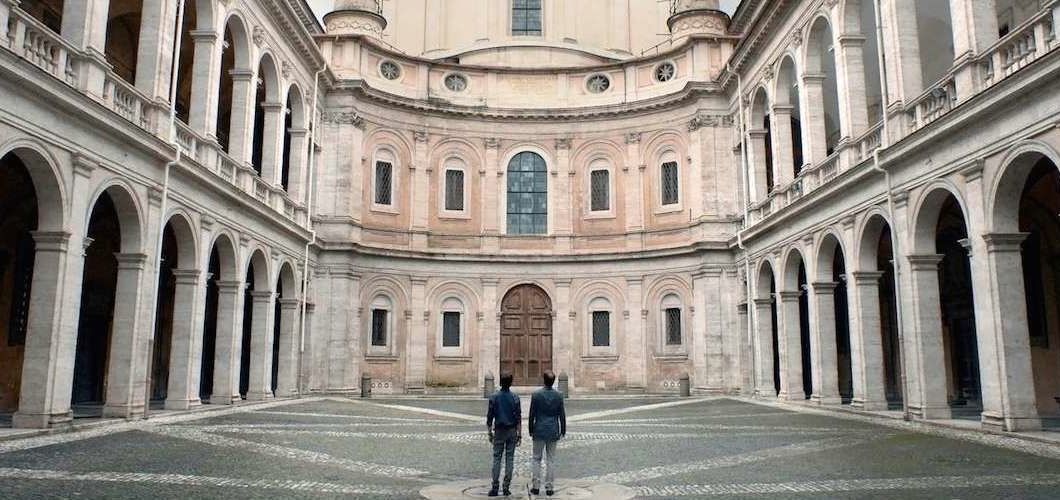Eugène Green’s La Sapienza is a confusing film, and save for some moments of beauty, a mostly unsatisfying one. It wears its many influences on its sleeve, but offers little style of its own, and its own insights – into marriage, love, beauty, architecture – come across as so trite and simplistic that the suggestion that it’s a parody of a certain type of arthouse film (which I heard from several bemused critics throughout the Festival) has stuck with me. If it is, it’s not a particularly incisive or funny one, though its targeted demographic (older people who watch foreign films for scenery) ate up every “weird” tic, like deadpan acting or earnest dialogue. In fact, the patron sitting behind me whispering the names of the Italian landmarks in the film almost complemented my viewing experience, both he and the filmmaker tuned into a common strand of obnoxiousness that I felt similarly irritated by and alienated from.
Swiss architect Alexandre Schmidt (Fabrizio Rongione) is successful in his career, but less in his marriage to wife Aliénor (Chistelle Prod Landman). They travel to Italy so Alexandre can continue researching his book on Baroque architect Francesco Borromini. They meet a pair of siblings, the sister Lavinia (Arriana Nastro) is prone to fainting episodes, and her brother Goffredo (Ludovico Succio) is continually by her side. As Aliénor strikes up a friendship with bedridden Lavinia, she suggests Alexandre take Goffredo – an aspiring architecture student – with him on his trip. As the film follows these two new pairings, the stern Alexandre gradually opens up with Goffredo, revealing ghosts of his past, while also expressing his admiration for Borromini’s work and philosophy, which the film does capture in some stunning shots. We never really learn enough about these characters for the film to work, with information only conveyed in a very lazy way – for example, a shot of our married couple out at dinner, silent, and then a shot of them in bed again without talking or touching is both milked for deadpan humour and offered up as a very obvious way of showing that the relationship is not a happy one. But the film at least hints at some intriguing developments, like the peculiar bond between Lavinia and Aliénor before it forgets them in favour of the boys’ trip.
But the stylistic gestures resonate more than the loose plot, and it’s a real hodge-podge of influences. Striking in particular are the affect-less and stilted performances of the lead actors who feel like Bresson’s ‘models’, although often shot front-on in dialogue scenes, like Ozu’s domestic scenes. Shades of other films like Kiarostami’s Certified Copy come to mind, and the settings and generic attires of protagonists bring forth the Rohmer comparisons as well. It’s intentionally grating at points and often overdone, to no discernible effect (no other people in the film outside of our four leads act this way). Those directors have aesthetic philosophies behind their distinguishable styles, and without having seen Green’s earlier films (this is his first feature since 2009, and the first to receive theatrical distribution in America), exactly what a Eugène Green film is outside of its egregious borrowings of style is hard to work out, or embrace.
This may be part of the film’s more satirical intent, but all of the baffling praise the film has received overseas takes the film at face value. Its observations on art and love feel like Hallmark platitudes rather than genuine ideas, and the central motif of ‘light’ comes across as fairly obvious and pat. As we follow Alexandre around, commentating their travelogue, his comments on Borromini’s work sounds more like what you would hear from a first-year architecture student on a gap year rather than someone accomplished in the field. The great director Hiroshi Teshigahara made a dull homage to a great architect (Antonio Gaudi) but at least had the respect for the artist and audience to let the work speak for itself. This is also an example of the film’s continual problem with its fascination with flowery language and gestures at the expense of character. And when Alexandre says that Goffredo was the one who taught him something, our audience laughed at the exchange as if it were a play on clichés from films much different from this, but my gut feeling was that it was embarrasingly sincere. Similarly popular with the gassed-up audience was the ignorant Australian outsider, frustrated by displays of European art pomposity. Well hey, at least I found a character to identify with.

